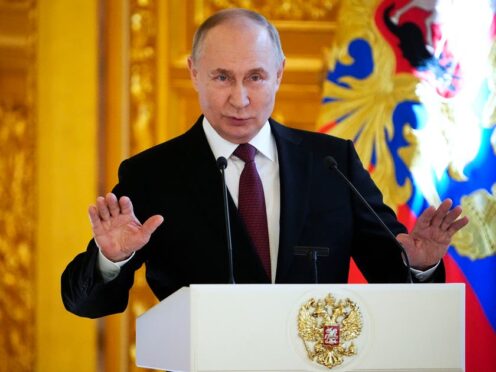
President Vladimir Putin has thanked Russians for casting ballots in a presidential vote in which he cemented his grip on the country for another six years after the harshest crackdown on dissent since Soviet times.
Any public criticism of Mr Putin or his war in Ukraine has been stifled, independent media have been crippled, Mr Putin’s fiercest political foe, Alexei Navalny, died in an Arctic prison last month and other opposition activists are either in jail or in exile.
Western leaders denounced the election as a sham.
Speaking in a video address following the announcement of the final results of the March 15-17 election which showed him winning 87% of the votes, Mr Putin argued that it reflected strong public backing of his policies.
“It means support for the country’s political and economic course, our common achievements that, of course, should be even greater but even now make Russia stronger and more independent,” he said.
The Central Election Commission on Thursday released the final official results of the balloting, which showed Mr Putin getting more than 76 million votes, the largest number in his nearly quarter-century rule.
His three token rivals from Kremlin-friendly parties who backed Mr Putin’s policies each received 3% to 4% of the vote.
In addition to there being little choice, no independent monitoring organisations were able to observe the election and analysts said online polling meant it was highly susceptible to manipulation.
While Mr Putin’s landslide victory was never in doubt, many Russians still attempted to defy the preordained outcome, heeding a call by Mr Navalny’s associates to protest against Mr Putin’s repression at home and his war in Ukraine by showing up at polling stations at noon on Sunday.
Lines outside a number of polling stations both inside Russia and at its embassies around the world swelled at that time.
Mr Putin has led Russia as president or prime minister since December 1999, a tenure marked by international military aggression and increasing intolerance of dissent.
At the end of his fifth term, Mr Putin would be the longest-serving Russian leader since Catherine the Great, who ruled during the 18th century.

Enjoy the convenience of having The Sunday Post delivered as a digital ePaper straight to your smartphone, tablet or computer.
Subscribe for only £5.49 a month and enjoy all the benefits of the printed paper as a digital replica.
Subscribe